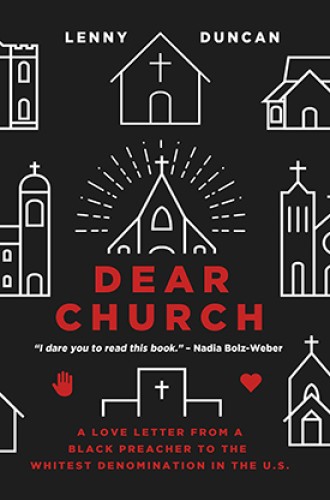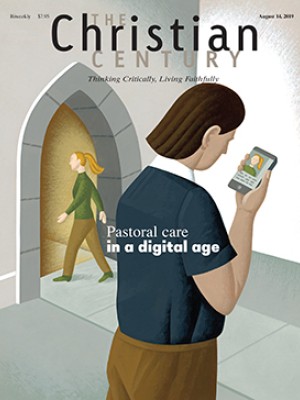A black pastor writes to the white church about its complicity in oppression
Lenny Duncan’s letter is full of hope and fury, love and lament—like Paul’s epistles.
It was difficult to pin down exactly what I’d read when I first closed Lenny Duncan’s book. It is both a letter, written in the style of the biblical epistles that have obviously shaped the author’s heart and mind, and a testimony. Like every good letter, and like the letters of scripture, it’s full of hope and fury, love and lament. It proclaims deep truths to readers who, like someone caught in a bear trap, don’t know at first what they’ve gotten themselves into. It tricks you into turning the page by coaxing you even as it calls you out on your fear and ignorance.
This is exactly what the book needs to do, because it isn’t an easy read. Duncan takes no time in getting to the crux of his argument: “Dear Church, we are cowards.” We are too cowardly to name and resist the deep lies and pernicious evils that run rampant in our pews, our politics, and our pulpits. “We must meet our communities where they are, but the God of Jesus of Nazareth has never shied away from the proclamation of truth.”
Read our latest issue or browse back issues.
And what is the deep truth that Duncan teases out in these pages? That we are so afraid of death that we usher it in while remaining quiet about the evil that is killing us. We welcome it and wage it, having decided, subconsciously in many corners, that we’d rather die than live in a world where powers are shaken in meaningful ways.
Duncan addresses his letter to the denomination in which he serves as a pastor, the Evangelical Lutheran Church in America. But like the writers of the biblical epistles, he also offers wisdom for the rest of the Christian world. He directly addresses nearly every issue that church councils and pastors try to avoid, including capitalism, racism, homophobia, reparations for slavery, and the industrial prison complex. He sideswipes tangential issues like gun control and drug policy in the process.
Speaking honesty and from his own location—as a Lutheran, a pastor, and a queer black man with a criminal record—Duncan argues that the church must say something definitive about issues of power and justice, not only from the top down but also (and primarily) in small groups, church council discussions, fellowship halls, and parking lot conversations.
If the church doesn’t engage in such conversations, Duncan writes, we will be found wanting on the other side of history. “When did we see you as an oppressed person?” we will ask Jesus on that final day. Duncan believes that the church isn’t ready for Jesus’ response to this question. We need to be made ready, not only for the sake of future judgment but also so we can begin to live now into the abundant life the gospel points to.
This book is the sermon the church most needs to hear and is most afraid to heed. White supremacy and capitalism hold hands, Duncan contends, and the church has made no serious attempts to break that link because it grasps those same closed fists. Pastors, in particular, are at fault here. We need to keep our jobs in a shrinking consumer market, so we shy away from the toughest issues in order to maintain a shallow, tenuous peace.
Duncan also writes about the church’s complicity in what happens when white supremacy and capitalism intersect with rampant nationalism. America is not a melting pot or a nation of immigrants, as politicians on both the left and the right like to claim. It’s a nation of the powerful and the enslaved. The church has participated and continues to participate willingly in that enslavement.
In a chapter on reparations, Duncan proposes a course of action. Churches should look at every plot of land their buildings sit on, investigate the extent to which the procurement and development of each property participated in the disenfranchisement of slaves, and begin paying this debt (with interest) from their own coffers. “Now is the time for all of us to step forward boldly—to finally pay back what the church stole long ago.”
Statements like this can be dangerous, especially when addressed to those with ears not ready to hear. But Duncan believes that danger is inherent to Christianity. When the church willfully forgets that Christ calls us into danger, we create a quietism that is deadly.
In the book’s most haunting chapter, Duncan analyzes the paradoxical reality that he and Dylann Roof, the gunman who massacred nine people at Mother Emanuel in Charleston, are part of the same theological tradition. Who questioned Roof’s deadly ideology early on? If the church didn’t do it, or won’t do it, who will? Quietism, Duncan points out, is not at the root of Lutheran heritage. But it is the present reality in many pulpits and pews. At this point, readers are likely to understand on a visceral level what Duncan is saying and why he’s saying it with such urgency.
Duncan speaks loudly and clearly, cutting through the cacophonous noise of cheap love and cheap grace. If, as the church claims, it desires a future that is more diverse and more just than its past, it must shift how it works and walks in this world. Duncan shows how this transformation can happen on many levels, from changing the liturgical color of Easter (since the current use of white reinforces the idea that whiteness is salvific) to openly discussing how to begin to empty prisons through policy and action.
Duncan’s prose is difficult to read, and for good reason. It accurately describes a reality that should be hard to stomach. Dear Church is the kind of book that creates fissures in its readers, causing their biases to pour out, exposing their faults for all to see. My biggest critique of the book is really more of a concern about its reception. I worry that most of those who need its message (and I include myself in that group) won’t have the courage to crack open the book because they’re too afraid of being cracked open themselves.






